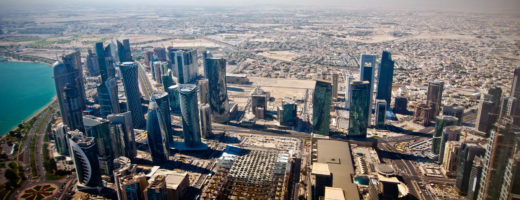Much like other small Gulf States in the Arabian peninsula finding recent and in-depth stories about gay life is not easy. The biggest public kerfluffle about homosexuality in Qatar in recent years has not concerned any gay executions, witch hunts, persecution or demands for gay marriage. Rather, in December 2010 the football/soccer World Cup association
Qatar is an Arab emirate occupying the small Qatar Peninsula on the northeasterly coast of the larger Arabian Peninsula. An oil-rich nation, Qatar has the highest GDP per capita in the world according to the CIA World Factbook. The judicial system in Qatar is based on the Shari’a, homosexual acts are punished with up to 5 years imprisonment. Article 201 of the 1971 Penal Code punishes sodomy between consenting adults (irrespective of sex) with up to five years imprisonment. As is the case with other “moderate” Muslim nations in the Middle East, enforcement of the law is sporadic and foreigners are often simply deported or given the option to leave, although since the 1990s there are reports that suggest that a crackdown on the law might be taking place. In the 1990s, Philippine Overseas Employment Administration informed Philippine workers that, “Gay workers banned in Qatar.” This was in response to several mass arrests and deportations of Philippine workers in Qatar, for homosexuality. In 2002, protests arose concerning the new Weill Cornell Medical College in Qatar. Critics expressed concern that LGBT medical students might face trouble with the law for their sexual orientation.

Qatar Country Photos
Qatar has been ruled as an absolute monarchy by the Al Thani family since the mid-19th century. Formerly a British protectorate noted mainly for pearling, it became independent in 1971, and has become one of the region\’s wealthiest states due to its enormous oil and natural gas revenues. In 1995, Sheikh Hamad bin Khalifa Al


